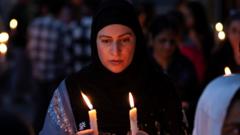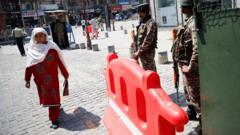Himanshi Narwal, a widow whose husband died in a militant attack in Kashmir, transforms from a tragic symbol to a target of online hate after urging peace amid rising tensions.
Himanshi Narwal: From Grief to Online Target of Hate

Himanshi Narwal: From Grief to Online Target of Hate
The widow of a Kasmir attack victim, Himanshi Narwal, faces backlash for her call for peace.
In a heart-wrenching turn of events, Himanshi Narwal recently went viral for a photograph that poignantly represented grief; she was captured grieving by the coffin of her husband, Vinay Narwal, who was slain in a militant attack that left 26 civilians dead in Kashmir. Only recently married, the couple was on their honeymoon when tragedy struck. As her image became a national symbol of loss, Narwal, in a courageous move, appealed against rising Islamophobia and tensions, urging people to refrain from targeting Kashmiri Muslims in the aftermath of the attack.
This call for peace, however, catalyzed a wave of online vitriol against her. Many who had initially extended their condolences turned quickly, inundating her with abusive comments. Her refusal to blame individuals based on their religion, despite the emotional chaos following her husband's death, angered a segment of the public. Personal attacks followed, questioning her relationships and accusing her of dishonoring her husband's memory, igniting a campaign fueled by harassment from netizens.
Leaders and organizations responded to the situation, emphasizing the importance of maintaining decency in public discourse. The National Commission for Women condemned the abusive backlash against Narwal, acknowledging the heartbreak behind her demand for peace and urging respectful debate on such sensitive issues. Journalist Namita Bhandare described Narwal's plea for calm as unexpected bravery, contrasting sharply against the narrative calling for revenge that often gets amplified in such scenarios.
Similar experiences of trolling were echoed by other survivors of the attack, further underlining the challenges women face in the realm of social media. Arathi R Menon, whose father died in the assault, faced scrutiny for her composed demeanor while recounting her trauma, which some deemed inappropriate in light of her loss. Expert opinions on the public's response hinge on the ingrained societal norms that place women as easy targets within these uproars.
Amidst the toxic social media storm, Narwal found allies who commended her strength. Supportive messages flooded in, with statements from activists and community leaders praising her courage to foster understanding rather than revenge.
Despite this support, no government action has been taken against the trolls, and political figures have been silent about the social media crackdown. Commentators voiced concerns about the frequent cycle of online harassment, cautioning that it simply might follow the trajectory of other similar campaigns, and the attention will eventually drift away from this incident toward the next hashtag trending in outrage.
As more people demanded accountability for the online abuse, the case of Himanshi Narwal encapsulates the complexity of grieving in the public eye while navigating aggressive social media landscapes, leaving many to reflect on society's treatment of women in the face of tragedy and conflict.





















